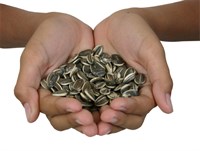Week 4
Week 4 pregnant
The placenta has started to form by now and will play a vital role in producing specific hormones and in feeding your baby. At this stage, the embryo is smaller than a grain of rice, but each of its cells are already programmed to fulfil a specific function.
It’s implantation time! This week, the tiny blastocyst has found its way to the womb and is looking for a suitable place to nestle in for the next 36 weeks or so.
Implantation usually happens at around the time you would be expecting your period so many women aren’t surprised when they have a slight bleed in the 4th week. But, if it’s only slight spotting, it could be an implantation bleed and not a regular period.
The wall of your womb is so engorged with blood at this stage that any disruption can cause a light bleed. Some women say they can actually feel the moment when the blastocyst embeds, and who can say they are wrong?
Can I get excited yet?
You are likely to suspect that you could be pregnant if your period doesn’t come when you expect it to. You may be experiencing some early pregnancy symptoms alerting you that your body is somehow feeling a little different to what it usually does. Don’t be concerned if you feel exactly the same as you normally do though. Even if you are officially 4 weeks pregnant, your body is still getting used to all of its pregnancy changes.
By the time you are 4 weeks pregnant it’s possible to confirm your pregnancy with a blood or urine test. Both are extremely sensitive to picking up Human Chorionic Gonadotrophin Hormone (HCG) if it is present in your system. You can use a pregnancy test at home. The best time to do this is when you wake up in the morning – this is when the concentration of HCG is at its highest in your urine.
Your physical changes this week
- You may feel some lower pelvic cramping and a sensation of “fullness”. You may feel bloated or have more wind than you usually do.

- You could start to feel some nausea, or morning sickness, especially if you haven’t eaten for a while. The smell or thought of some foods may turn you off, even if you usually love them. Coffee, fish, red meat and even pet food can be enough to make you feel you want to vomit.
- Your breasts may be tender and your nipples more sensitive. Your breasts may even look fuller and more rounded, especially if your breasts are usually a small size.
- You may want to go to the toilet to wee more often. You don’t seem to be able to hold on for as long as you usually do and only wee small amounts. This is because of the increase in your blood volume and the pressure of your womb pressing down on your bladder.
- You may have some slight spotting from an implantation bleed.
Your emotional changes this week
- You may be feeling a big sense of apprehension and excitement. Waiting to see if your period starts can seem like an eternity, with frequent stops to the bathroom to check.
- You may feel similar to how you usually do before you have a period. A little more emotional, easily irritated and generally more moody.
- If you want to conceive, but have a negative pregnancy test, you may be feeling disappointed with the result. Talk with your partner or a supportive friend.
- Alternatively, if you didn’t plan on getting pregnant, but find out that you are, this can also be a stressful time.
Your baby’s changes this week
- This week your baby is the size of a full-stop, or a poppy seed. It is still barely visible to the naked eye.

- In the 4th week of pregnancy there is a lot of organisation and cell separation going on. Three distinct layers of cells start to form.
- The ectoderm (outer layer) will eventually become the baby’s skin, eyes, hair, nervous system, brain and teeth.
- The middle layer (mesoderm) will become the baby’s skeleton, muscles, kidneys, tissues and vascular (blood) system.
- The layer on the inside (endoderm) will eventually become your baby’s internal organs.
- Once a cell has a specific function, it can’t become a different type of cell. Every one is pre-programmed from the start and knows what to do and what it is to become.
Hints for the week
- Buy a pregnancy test (or two) from your pharmacy. It is impossible to get a false positive reading, though in the very early stages you can get a false negative. Keep the test – if it is positive it is a nice memento to hold on to.
- Make the first of many antenatal appointments. This will initially be with your GP, who will refer you to a midwife or obstetrician for ongoing care.
- Avoid getting overheated and try to stay healthy. An elevated temperature in the early weeks of pregnancy can sometimes carry a risk to the baby as it is forming.

Now we move onto week 5, when your baby is getting well and truly comfortable.

